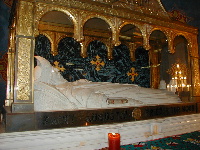From a Georgetown professor's visit to Hippo Regius:
The modern basilica is of less interest to students of Augustine but of no small interest to the history of French colonialism and modern Catholicism. Inter alia, it houses what is soberly presented as Augustine's elbow. The story has it that Augustine's remains were removed from Africa either in the time of the Vandals (430-534) or in the face of the Islamic invasions (taking Carthage in 698) to Sardinia, and thence removed again to Pavia, where they lie today in the same church as the remains of Boethius. Whatever the truth of that story, it was French colonialism and French Catholicism together than made representations in the nineteenth century that it was only appropriate that some piece of Augustine's remains return to Hippo. Thus in 1842, an elaborate ecclesiastical pilgrimage from Pavia to Bône (as Hippo/Annaba was then known) brought Augustine's elbow. (The traveling reliquary from that translation was on display in the lobby of Annaba's theater in a small exhibit during our visit.) The elbow has now been inserted for veneration in the anatomically appropriate spot in a large carved figure of the saint, recumbent behind the main altar of the basilica. The church is served to this day by Augustinian priests (the archbishop of Algiers, we were told, numbers about 10,000 catholics in his flock and comes himself from metropolitan France). Plaques on the side walls of the basilica memorialize various benefactors, including a number of Americans and, in at least one case an entire American military unit from World War II. (One apology will stand for all here: we traveling Augustine scholars were acutely aware how ill-informed we were about much local history. On return to the US, I find that the theatre, for example, is a 1940s reconstruction after bombing that destroyed the nineteenth century house on the same site.)